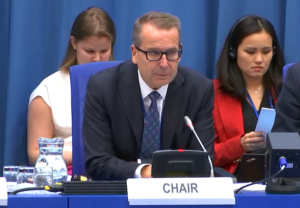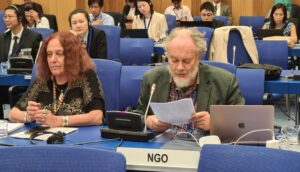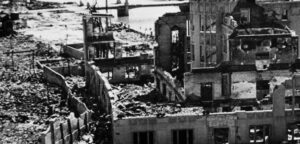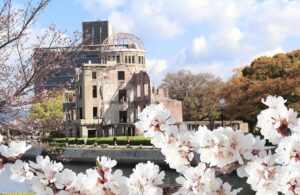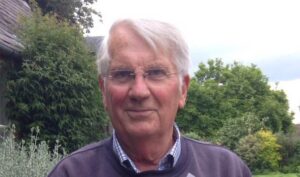On July 28, senior officials and diplomats from the United States and Russia held the first meeting in Geneva for the ‘integrated bilateral Strategic Stability Dialogue’ which was agreed by Presidents Biden and Putin at their Summit Meeting on June 16.
Presidents Biden and Putin affirmed in the joint statement on June 16 that ‘a nuclear war cannot be won and must never be fought.’ The Strategic Stability Dialogue provides a forum to give substance to this, and in particular to ‘lay the groundwork for future arms control and risk reduction measures.’
The US team was led by Deputy Secretary of State Wendy Sherman and Under Secretary of State for Arms Control and International Security Bonnie Jenkins, while the Russian team was led by Deputy Foreign Minister Sergey Ryabkov.
Prior to the Biden-Putin Summit of June 16, some of the co-founding and participating organizations of NoFirstUse Global sent an Open Letter to Presidents Biden and Putin highlighting that a nuclear war cannot be won and must never be fought, and calling on the two countries to adopt no-first-use policies in order to prevent nuclear war and support nuclear disarmament. The Open Letter was endorsed by over 1200 political, military and religious leaders, legislators, academics, scientists and other representatives of civil society.
Then, on July 19, some NoFirstUse Global participants sent a follow-up letter to the two Presidents and to their officials and diplomats who were preparing for the first Strategic Stability Dialogue meeting. The letter supports the Strategic Stability Dialogue process and recalls the recommendation made in the June Open Letter that the two countries adopt no-first-use policies.
“In strict logic, if no one ‘fires first’ with a nuclear weapon, as No-First-Use implies, then the war that ‘cannot be won and must never be fought’ cannot take place. Whatever caveats might be added to that (accidental launch, miscalculation, malware, etc), it is clear that a commitment to No-First-Use, does at least make escalation to nuclear war much much less likely.” Russia-USA Strategic Stability Dialogue – No First Use. (July 19 Letter to the Delegates to the Strategic Stability Dialogue from the Abolition 2000 Nuclear-Risk-Reduction Working Group, Human Survival Project, People for Nuclear Disarmament, World Future Council and Zone Libre).
Despite high tensions and a range of disputes between the two countries, both sides reported favourably, if cautiously, on the first meeting.
The US State Department reported that “The discussions in Geneva were professional and substantive. The two delegations agreed to meet again in a plenary session at the end of September, and to hold informal consultations in the interim, with the aim of determining topics for expert working groups at the second plenary.” The State Department added that “We remain committed, even in times of tension, to ensuring predictability and reducing the risk of armed conflict and threat of nuclear war.” (See Deputy Secretary Sherman’s Participation in Strategic Stability Dialogue with Russian Deputy Foreign Minister Sergey Ryabkov, US State Department, July 28, 2021)
The Russian Foreign Ministry said that the talks yielded a “comprehensive discussion of the sides’ approaches to maintaining strategic stability, the prospects for arms control and measures to reduce risks.” (See US, Russia hold ‘professional’ arms talks despite tensions, AP News, July 28, 2021)
“We have significant differences on key issues,” said Russian Deputy Foreign Minister Sergey Ryabkov following the talks. “But there are also points of convergence, and we intend to capitalize on them.”
In an in-depth report on the meeting, Kingston Reif and Shannon Bugo from Arms Control Today discuss the next steps in the dialogue process – including the establishment of working groups to address specific issue areas.
They note that “Last year, the two countries formed three strategic stability working groups on nuclear warheads and doctrine, verification, and space systems.” In addition, during the July 28 meeting “the two sides also touched on issues related to space and the strategic implications of artificial intelligence and cyber policy, which perhaps suggests possible subject matters for the groups.”
Rose Gottemoeller, the chief U.S. negotiator for New START, suggests that the topics could include missile defense, new and emerging technologies such as hypersonic glide vehicles, and the framework for a successor agreement to New START.
Mikhail Gorbachev, former leader of the Soviet Union, called on the process to yield concrete results in nuclear weapons reductions.
“Stability alone is not enough. We need to negotiate lower levels of nuclear weapons. Then, it will be possible to engage other countries that have nuclear weapons — China, the United Kingdom, France, and others. And [then we can] move together towards the ultimate goal — the elimination of nuclear weapons. I have said it many times and repeat: there can be no other goal. Because nuclear war is unacceptable.” Mikhail Gorbachev. (See Ex-USSR Leader Gorbachev: Russia and US Need to Agree on Lower Nuclear Weapons Level, Sputnik, July 31, 2021).
President Biden remarked after his summit meeting with Putin in June that “We’ll find out within the next six months to a year whether or not we actually have a strategic dialogue that matters.”
Lynn Rusten, Vice President of the Nuclear Threat Initiative and a senior director for arms control and non-proliferation on the Obama administration, expresses optimism for the process, saying that “We have a president who really understands these issues and recognizes the importance of trying to cooperate with Russia – even though we have so many differences – because we can’t afford a nuclear incident.” See Biden’s 6-Month Clock On Russia-U.S. Nuke Talks Starts Now, Defence One, July 28, 2021).
Photo: US Deputy Secretary of State Wendy Sherman and Russian Deputy Foreign Minister Sergey Ryabkov meet before the start of talks in Geneva on July 28, 2021. Public Domain Photo / Eric Bridiers / U.S. Mission Geneva.

